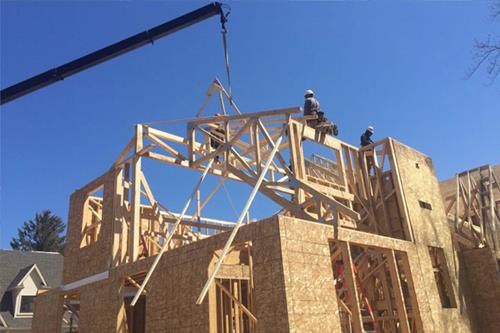Trudeau offers billions to boost homebuilding - with strings attached
4/2/2024
| SHARE
Posted in Government and Regulation by Vanguard Realty | Back to Main Blog Page

Prime Minister Justin Trudeau is pressuring Canada’s provinces to remove barriers to building more housing, including requiring them to freeze municipal development charges and allow up to four units on every lot.
Trudeau announced his government will provide CA$5 billion ($3.7 billion) in new infrastructure funding for provinces, but only if they sign an agreement by Jan. 1, 2025, to make certain reforms to allow for increased housing supply.
The move puts Trudeau’s government squarely in conflict with Ontario Premier Doug Ford, who recently ruled out allowing fourplexes as-of-right across Canada’s most populous province. Ford argued that putting larger buildings into communities of single-family homes would create “a lot of shouting and screaming,” calling it “a massive mistake.”
But as Trudeau’s government sinks in the polls, the prime minister is attempting to relieve Canada’s sky-high housing prices by boosting construction — and to put the spotlight back on provincial and municipal governments, which control most of the direct policy levers on housing.
Trudeau also announced the government will tie federal transit funding to municipal rules such as eliminating minimum parking requirements near a mass transit line, and allowing high-density housing near both transit systems and post-secondary institutions.
“One of the biggest pressures on young people right now is housing,” said Trudeau’s office in a news release. “We need to bring home prices back within reach by increasing housing supply right across the board – and quickly.”
The new provincial infrastructure money will be earmarked for “critical housing infrastructure” such as water, wastewater, stormwater, and solid waste infrastructure, the news release said.
To qualify for the federal funding, provinces will have to agree to “key actions” that include requiring cities to approve four units as-of-right, implementing a three-year freeze on increasing development charges in larger cities, and adopting changes to the national building code to support more housing options.
The news release also said provinces would have to adopt measures from the federal government’s planned “bill of rights” for both renters and homeowners, but it did not specify what those measures would be.
Ontario Housing Minister Paul Calandra’s office said the provincial government needs to see the details of the proposal. “However, we know that local municipalities know their communities best and don’t believe in forcing them to build where it doesn’t make sense,” a spokesperson said in an emailed statement.
The federal government will make a further CA$1 billion available in infrastructure funding directly to municipalities, Trudeau said.
The federal Housing Accelerator Fund will also get a CA$400 million top-up, bringing it to a total of CA$4.4 billion. That fund has been used by Housing Minister Sean Fraser to push cities to loosen their zoning rules and allow for denser housing construction.
The Conservative Party — which is currently far ahead of Trudeau’s Liberals in the polls — criticized the new measures as ineffective. “Today’s announcement shows that the Liberals have no solutions to the crisis they created,” said a statement from Conservative Leader Pierre Poilievre’s office. “Under Trudeau, Canada is building fewer homes than we did in the 1970s when Canada had half the population, yet the Liberals continue to double down on their failed policies.”
Tuesday’s announcement follows a pledge last week to boost renters’ rights, and other recent announcements on expanding child-care spaces and creating a school food program.
The measures are all to be included in the April 16 federal budget, and are aimed mostly at voters aged 40 and younger, a cohort that has increasingly turned against Trudeau over the past couple years, according to public opinion polls.
Source: Bloomberg News
Government Intervention, Government of Canada, New Condos, New Developments, New Homes, Real Estate News

Thinking of buying or selling a property, or have a question regarding the real estate market? Fill out the form below and we'll get back to you promptly.
